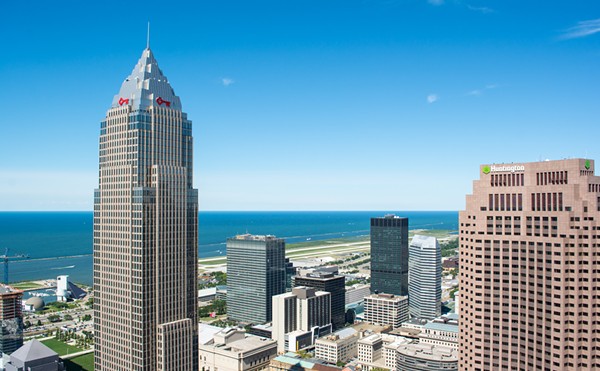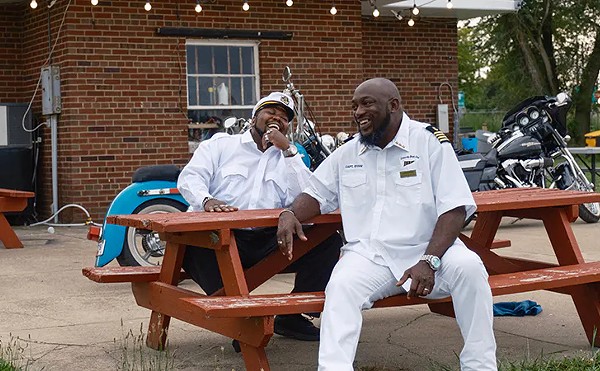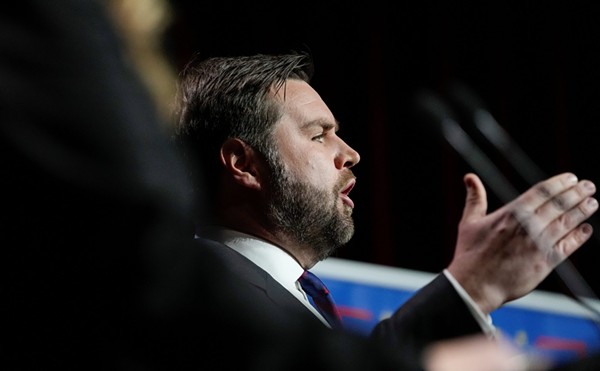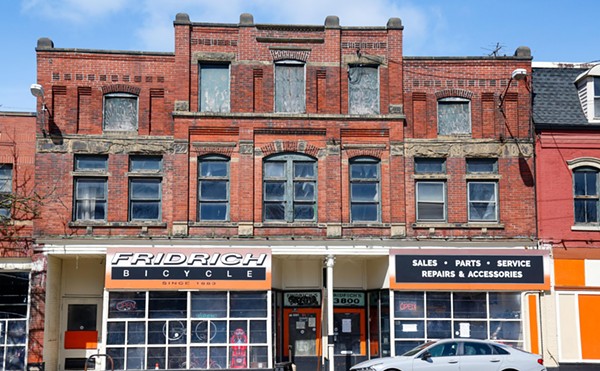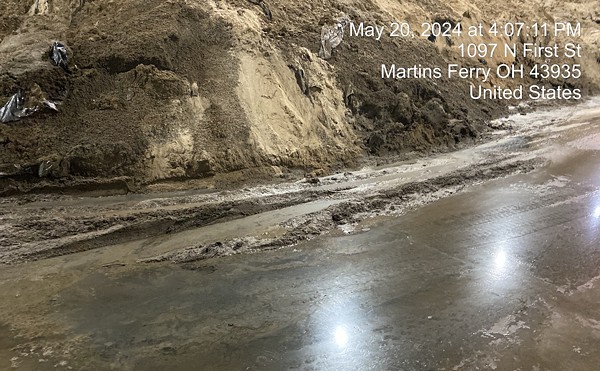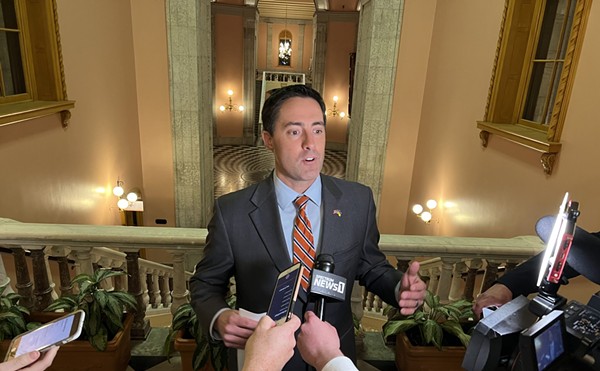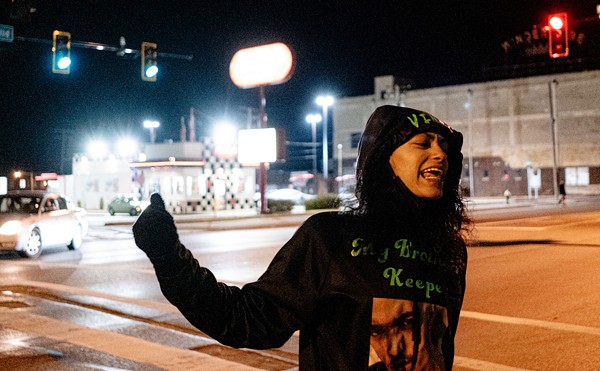Lightner barely noticed anymore. For years, the same group of boys caused problems in the tangle of streets off Ashbury Avenue in Glenville, fighting, making noise, vandalizing. Once, Lightner caught a couple of them selling drugs in the hallway of her building, a squat brick apartment complex on 114th Street her family has owned for years.
But that night, as Lightner sat on her couch watching TV, something seemed odd: It was quiet. "It was a loud brawl, then it just kind of faded in a matter of seconds," she says almost five years later. "You could just feel the rush."
Moments later, the unmistakable pop of gunfire shook the neighborhood. Though Lightner was dealing with a bout of meningitis, her body so stiff that she could hardly move, she hit the floor. She didn't want to die staring at the television.
The next morning, neighbor Athena Howard called: Somebody was lying in Lightner's backyard. When she made it to the window, she saw the figure of a young man. He was face-down, wearing black jeans, Air Jordans, and a Tommy Hilfiger jacket. His arms were folded underneath his body, left hand resting near his face. The jacket hood was pulled over his head, as if he were trying to block the light so he could sleep. Lightner couldn't tell if he was dead or alive.
She thought back to the night before. "And then I called the police."
Fifteen-year-old Benjamin McDougall had been dead for hours. A single 9mm bullet tore through his lower back, perforated the lowest bone in his spine, and ripped through several internal organs and a branch of arteries. Nevertheless, McDougall likely didn't die immediately, the coroner's office later ruled. He bled to death as he lay in Lightner's yard.
Determining how he got there would prove a far more daunting task.
Eight months later, a grand jury indicted a 28-year-old ex-con named Alfred Holly. A DJ who made money selling weed and recording gangsta rap in his basement studio, Holly didn't cut a sympathetic figure. Police believed he was a leader of Rockland, a gang of young men who dealt in crack and mayhem on the streets where McDougall was killed.
Holly's history fit the part. Earlier that year, he had been convicted of aggravated assault and gun possession. But that was only his latest bit of trouble. Six years before, in 1991, he was convicted of involuntary manslaughter, after he and several friends beat a man to death on New Year's Eve.
Despite McDougall's age, neither the murder nor Holly's trial merited much media attention. As a hazy picture of the events emerged, the story took on the sad refrain of countless blurbs on TV news. Gangbangers. An argument outside a party. A gun. Another murder.
On April 3, 1998, after two days of testimony, Holly was found guilty. Three days later, Judge Richard G. Lillie told him: "It is the court's opinion that you are, in fact, a gangster." He sentenced Holly to 28 years to life in prison. Then the world promptly forgot about Alfred Holly and Benjamin McDougall.
But that may change.
Four years after his trial, questions about the murder continue to hang over Holly's conviction. In early November, Brian Howard, a key witness against Holly, signed an affidavit saying he lied about Holly's role to help a friend, Maurice Freeman, avoid being charged. "We felt at the time that we had to do whatever was necessary to get Maurice out from under this murder," Howard's statement says, "even if it meant lying on Alfred Holly."
Last summer, Freeman -- an initial suspect in McDougall's murder, who eventually testified against Holly as part of a plea deal -- was indicted for the shooting deaths of three people. (Freeman was convicted in December for the murder of Alfonso Amos. A second trial, for the slayings of Starr Hudson and Kenneth Johnson, is scheduled for early April.)
Today, of the two men who provided the most damning testimony in Holly's conviction, one has recanted, and the other is a convicted murderer who had ample reason to lie about Holly. The world, it turns out, may have to start thinking about Alfred Holly and Benjamin McDougall again.
The party was a bust. That much Anthony Johnson knew. There was some music and dancing, some drinking and weed. But he didn't know anybody there. Hell, he didn't even know whose house it was. That's why he wasn't drinking. He didn't feel comfortable. Worse, there were only a few girls there.
Around 9:30 p.m., after staying just 45 minutes, Johnson and friends from his Lee Road neighborhood -- Hasan Turner, Henry and Aunray Tucker, Benjamin McDougall, among others -- decided to take off.
As the group, which probably numbered a dozen, walked west on Kelton Avenue, talk centered on the party, about why nobody was staying. "Ain't no ho's at the party," Turner explained loudly, to no one in particular.
When they reached the intersection of East 115th and Kelton, they saw someone running up the street from near the house they had just left. Johnson hadn't seen the man before. He looked to be in his early 20s, with dark skin and nappy hair.
"Who you calling some ho's?" he angrily asked the group. "What set you claiming? This is Rockland."
Hasan Turner tried to cool the guy down. "Ain't nobody said nothing about no ho's. We're just trying to get home. We ain't causing no trouble."
No one needed to be reminded what Rockland meant. It wasn't so much a criminal enterprise -- à la the Bloods and Crips -- as it was a bunch of bored thugs selling crack and wet, acting tough. "Idiots with drugs and guns," one neighborhood resident calls them.
As the group tried to back away, Johnson saw the man pull out a gun, a black 9mm. "Get those niggers," Johnson heard someone yell from behind the gunman.
That's when the shooting started.
Everyone scattered "like cockroaches when the light's turned on," Turner later told police. Johnson ran down Itasca Avenue. He ducked into a yard and started jumping over fences. Turner also took off down Itasca, followed closely by McDougall and Henry Tucker. As Turner glanced back at the shooter, he saw that McDougall had fallen. He must have tripped in his rush to get away, Turner figured.
Minutes later, the group met at a store on Ashbury Avenue. Two people were missing: Kenny "Boo" Stackhouse and Benjamin McDougall.
They weren't worried about Stackhouse. He didn't run with the group anyway, and his brother lived in the neighborhood. He was friends with many in the Rockland gang.
But they were worried about Benjamin. They decided to go to Johnson's house, where they called hospitals and the Fifth District police station. There was no sign of him. Finally, Johnson, Turner, and the Tucker brothers went to Ben's house. He wasn't there either. After they told his mother what happened, they went back to the scene, hoping to find him. Nothing.
The next morning, Aunray Tucker called Johnson: Somebody found Ben.
Detectives Robert Matuszny and Michael O'Malley were assigned the case. They didn't lack material. More than a dozen people had seen or heard the shooting.
Rumors rolled through the neighborhood like a winter fog. "It was all anybody talked about for a while," says a man who lives in the neighborhood and knows many of the people involved.
Much of the initial talk centered on a pair of brothers: Maurice and Mario Freeman, members of the Rockland gang with substantial records. Mario had been arrested for drug abuse, trafficking, assault on a police officer -- all in the previous two years. Maurice was also on the illicit fast track. The year before, he pleaded guilty to assault charges and was given a year of probation -- a bit of judicial generosity he soon violated.
More revealing was the recollection of McDougall's friends. Several told police they had seen at least two men with guns that night: one, a black man about 20 years old, wearing black jeans and a black sweater; the second, a black man about the same age, wearing a red jacket.
Many of the people police spoke to identified Maurice Freeman as one of the two gunmen. Hasan Turner, Anthony Johnson, and a friend named Clifford Williams all identified Maurice as the one who first approached the group. Aunray and Henry Tucker also told cops they saw Maurice with a gun.
But there were different recollections of what Freeman was wearing. Some identified him as wearing black clothes. Others said he had a red jacket. "They identified the photograph, but they did not identify the clothing he was wearing," Matuszny recalled. "They were completely opposite with the clothing. We couldn't tell if they were identifying Maurice Freeman or not."
In early July, Matuszny was paged by an officer in the Fifth District Strike Force. They had picked up Mario Freeman on a misdemeanor. Did he still want to talk to him? Freeman told Matuszny he was present during the murder. Yet Freeman was reluctant. "Everyone knows who did it, but they were all afraid," he said.
Finally, Freeman told Matuszny what had happened that night: He didn't have a gun, nor did his brother. When he saw the crowd at the corner of East 115th and Kelton, he went to see what was happening. Suddenly, shots rang out, and people started running.
"I ran around the corner, because I thought the dudes from 105[th Street] were shooting at me," he told Matuszny. When he got there, he saw only one man with a gun -- two guns, actually, a pistol in each hand -- shooting down the street at McDougall and his friends.
"I stopped and turned around," he remembered. "I saw that Alfred was doing the shooting."
By 1997, Alfred Holly was already a convicted felon, small-time drug dealer, and hip-hop producer, a man known in the neighborhood as "Dizdog." At his mother's house on Oakland Avenue, Holly set up a spartan studio, where he'd lay down beats for aspiring rappers -- mostly just neighborhood kids.
Holly had always been into music, his mother recalls. Though they never had much money during Alfred's youth, he would scrounge and save so he could buy tapes of Eric B & Rakim, Run D.M.C., and Poor Righteous Teacher. By the time he was a teenager, he had stacks of them in his room. He brought equipment to DJ parties. He seemed to know about the newest groups, the latest songs, as soon as they came out. "I would listen to gospel on the radio, while he'd be in his room with his tapes and his keyboard," says mother Suzanne Holly. "He just loved music. That was his dream."
At John Hay High School, Holly enjoyed drawing and running track, but he was a poor student, and his academic prospects ended after a semester at Tri-C. He got a job at a grocery store, sold drugs, and continued to DJ. "It first started with hip-hop break dancing," says Holly. "Then I bought my own equipment and started DJing parties at schools, wedding parties, house parties, and all types of stuff."
He also began his slide into urban cliché: a bored young man with few ambitions and little hope for the future. "He was with the wrong people," says his mother. "They was selling drugs. They was drinking. Things got out of hand."
On New Year's Eve 1990, that became clear. After drinking at a party, Holly and some friends went to a party at Art's Seafood on Euclid Avenue. Outside the restaurant, they got in a fight with the owner and several party guests. One of Holly's friends got kicked in the head. Holly got hit with a stick, which split open his eye.
They retreated to the home of Manderlin Lavette, but Holly decided he needed to go to the hospital. On the way, Holly and three friends spied Roger Martell, a freelance photographer whom they had fought at Art's. They forced Martell's car into a fire hydrant, pulled him out of the car, and beat him to death.
Nine months later, a jury found Holly guilty of involuntary manslaughter.
He had never been imprisoned before, but the experience didn't seem to shock his system. "You see all those movies about what happens, so you're scared," he says. "But once you get down there, it's everybody you know . . . People you used to see, people you didn't know what happened to them. They all in jail. So you get down there, and it's like you still going to high school or in college somewhere."
In 1993, after little more than two years in prison, he was released on shock probation. He had written lyrics while he was incarcerated, and he started hanging out at a friend's recording studio once he was freed. "I was spending all my money, but I was getting knowledge on what he was doing. I was like 'I could do that for myself.' I went and bought a keyboard and started making my own beats. Then I started buying everything."
He sold weed on the side, but he was soon spending all of his time in the studio, charging people to record their songs. Many of his customers were friends of his brother Earnest: Maurice and Mario Freeman, Brian Howard, Sundiata Langford, Hurlon and Thurlon Hill. "They would just come over and chill," says Holly's mother. "They were always over there."
For several years after his release, Holly kept out of trouble. But in November 1996, he was in his studio with his brother Earnest when three men Holly didn't know -- Lavelle Harris, Frank James, and Curtis Meredith -- stopped by. Harris and Holly soon began arguing, and Holly kicked him out of the house. Outside, Harris was beaten by Earnest and two men he couldn't identify. Harris ran into the nearby Finast supermarket.
When Harris stepped outside, Alfred, Earnest, and two other men -- Holly says it was Maurice Freeman and Sundiata Langford -- were waiting for him. Harris was beaten with a baseball bat, kicked in the head and face. It wasn't until he was in the hospital that he regained consciousness. In May 1997, Holly was convicted of felonious assault. He was sentenced to five years in prison.
By that time, Holly's name had already surfaced in the McDougall investigation. Less than a week after the killing, Fred "Quammi" Jones told police that he'd seen three men with guns the night of the murder. Two days later, Jones said, a friend told him a guy named Alfred Dizdog shot McDougall.
Others had also mentioned Holly. Anthony Johnson heard Holly was there that night. Hasan Turner also identified Holly as being in the group that confronted McDougall and friends. Yet the connections were tenuous. Several of McDougall's friends were unable to pick Holly out of a lineup. None said they had actually seen him with a weapon.
"We knew Holly was one of the shooters, but we couldn't prove nothin'," says Matuszny. "Everybody on the street was saying they saw Alfred."
Meanwhile, rumors continued to fly. At the end of April, an informant told police that Mario Freeman was the shooter. A few weeks later, Benjamin McDougall's sister, Theresa, was approached by a bouncer at Vel's Party Center. He said he'd seen the whole thing: Maurice Freeman pulled the trigger.
By mid-July, police were finally able to speak to Maurice himself. He was standing on the porch of the party house on the night of the shooting, he said. He ran to see what was happening, but it was all over by the time he got there. He knew the word on the street was that he, Mario, and Earnest and Alfred Holly were involved. He was adamant: He didn't do anything.
Ten days later, the cops interviewed him again. Once more, Maurice said he never had a gun that night.
The investigation stalled. Finally, in late October, police picked up Brian Howard, a Rockland member who was at the scene of the shooting.
Two weeks later, Holly was indicted for murder.
The trial wasn't a lengthy affair. Testimony took all of two days. Assistant County Prosecutors David Zimmerman and Lisa Mahnic called 10 witnesses -- a scant number for a murder trial -- including two employees of the coroner's office and four police officers. Of the people who testified, only three actually saw what had happened that night: McDougall's friend Anthony Johnson, Brian Howard, and Maurice Freeman.
Johnson, one of the few people who wasn't drunk or stoned that evening, once again identified Maurice Freeman as the man he saw with a gun. More important to prosecutors was what Johnson didn't see: Freeman actually pulling the trigger. "When he pulled out the gun, the shots was coming from behind us, and he still had the gun and he didn't fire it," Johnson recalled. "He probably fired it after we ran, but he didn't fire it when I seen it."
A key to the state's case was Howard, a longtime friend of the Freemans' who had been at the party with two members of the Rockland gang, Sundiata Langford and Hurlon Hill.
Howard recalled that, just as Benjamin McDougall and his friends were leaving the party, he saw several Rockland members, including Maurice, Mario, and Earnest, walking up the street from the opposite direction. When one of McDougall's friends started talking about "ho's," Mario confronted them. "He seen them, he thought somebody was about to fight," Howard remembered. "He was drunk. So he went up like 'What's going on, what's up?' Then I guess the boys was scared."
That's when Holly arrived in a blue sports car driven by his cousin, Kim Holly, according to Howard. Maurice ran up to the car and asked for "the shit" -- a gun. Instead of handing the weapon over, Holly jumped out of the car and started firing, Howard recalled, shooting toward the fleeing kids with a 9mm pistol in one hand and a .25 caliber automatic in the other. "He jumped out of the car and started shooting," Howard said. "He seen his brother. He didn't even know it was some little kids. He didn't know who they was."
For the most part, Maurice Freeman's story echoed Howard's. When Freeman arrived at the party, he saw McDougall and his friends walking away. Soon he saw Holly drive up in a maroon car. Another woman, whom Freeman knew only as Tamika, was in the passenger seat. Alfred Holly was in the back. When Freeman asked him for a gun, Holly got out of the car and started walking toward the group. Freeman ran ahead. Then the shooting started. "I was chasing people down Itasca," Freeman noted. "He started shooting. I turned there to wonder why is he shooting in the crowd . . . I chased somebody into a backyard, grabbed his shirt, and let him go."
Neither Howard nor Freeman came off as model citizens, yet Holly's attorney, John Luskin, made little mention of the inconsistencies in their stories. The different makes and colors of the car Holly was riding in. The presence of another passenger in Freeman's version. Freeman's recollection of running down Itasca Avenue -- the same street Holly was shooting down -- despite other witnesses' statements that he ran down East 115th, a street perpendicular to Itasca.
More important, Luskin didn't call any of McDougall's friends to establish that they didn't see Holly there. "You don't want to insult the intelligence of the jury," Luskin now says. "Maurice Freeman, the way he described things . . . it just didn't make one bit of sense to me. I didn't think anyone would put stock in it."
There was also the fact that Freeman changed his version of that night after a plea agreement. He was initially charged with felonious assault, accused of shooting at two of McDougall's friends. In February 1998, six weeks before the trial, however, he made a deal. In exchange for corroborating Howard and Mario's version of events -- that Holly killed McDougall -- prosecutors dropped the assault charge.
Freeman pleaded guilty to aggravated menacing -- a misdemeanor -- and eventually served six months in the county jail.
Howard's testimony was also less than pristine. As he revealed under cross-examination, he decided to talk only after police put one of his friends, Sundiata Langford, in jail. That's when the cops told him that Holly indicated Howard might be responsible for the killing.
Holly, in fact, had never spoken to police. At the time, he was serving time for his assault conviction at Lorain Correctional Institution; no one had ever interviewed him.
To this day, Holly remains adamant that, had Luskin done a better job, he would be a free man. "He didn't call none of my witnesses or nothing . . . He told me we didn't need them; the jury wasn't going to believe Brian or Maurice."
It's an almost universal complaint among convicts, but Holly's gripe is not without merit. Other than Freeman -- who had an interest in Holly's conviction -- his brother Mario, and his buddy Howard, no one could place Holly at the scene with a gun in his hand. In their statements to police, none of McDougall's friends recalled seeing Holly at the scene. Nor did any of them recall seeing either a maroon Corsica or a blue sports car drive up.
Holly, in fact, claimed he had been at home all night, throwing a party. Yet Luskin didn't call a single witness to establish an alibi, though more than a dozen people attended the party, Holly says.
"I wanted to file a motion for alibi," Luskin says, "but a lot of those people were not sure where the party was. And no one was able to substantiate the time frame of when it was."
In May 1998, Alfred Holly appealed to Ohio's Eighth District Court of Appeals. Attorney Paul Mancino argued that Holly was denied effective counsel. By allowing Detective Matuszny to testify about who the shooter was, by allowing evidence of gang activity, by allowing Holly's prior conviction to be put before a jury in "unrestricted fashion," Luskin's work constituted "a complete abdication of the adversarial role counsel should play in defending."
"The way he asked those questions, he gave Matuszny an opportunity to put his whole theory before the jury that Holly was guilty," says Mancino. "When you get that from a policeman, that carries a lot of weight with the jury."
The court rejected the argument (though it did find that Holly had been improperly sentenced). A year later, the Supreme Court similarly rejected Holly's appeal.
In most cases, Holly's options would have been exhausted. But this fall, he was given a sliver of hope. Since his conviction, he has attempted to contact Maurice Freeman and Howard to ask them "why they lied on me." Several times Howard admitted he had not told the truth, Holly says. The only reason Howard implicated Holly was because he thought Holly was trying to incriminate him and Maurice.
But Holly needed the admission on paper. Though he'd spoken to Howard by phone, he was unable to find an address to have someone track him down or to send him an affidavit. Finally, in November, Holly discovered that Howard was in the Cuyahoga County Jail. He'd been arrested in July for allegedly beating a woman. Two of Howard's alleged fellow attackers were Maurice Freeman and Holly's brother, Earnest.
Holly asked Howard to sign an affidavit saying he was "tricked, coerced, and intimidated" into testifying against Holly. "I wrote and told him he ain't got to be afraid of Maurice no more. Now he can go ahead and tell the truth."
According to Howard's affidavit, the truth went like this: Holly had been in jail six months for the beating of Harris when police arrested Maurice Freeman for his involvement in the McDougall shooting. Shortly after, police arrested another Rockland member, Sundiata Langford. When Howard went to get Langford out of jail, Langford told him that police had spoken to Holly, and that Holly had pinned the murder on someone named Suni or Maurice.
Holly's betrayal of Freeman made sense to Howard. Before Holly had gone to jail, the two men had a falling out "about some dealings with music and personal problems." Howard figured Holly was trying to get back at Freeman and get out of jail by cooperating with police. To avoid being charged with the murder, Howard turned the tables on Holly. "The only way we figured to get either Suni or Maurice off the hook of this murder was to reverse the situation and say that Alfred Holly committed this crime," Howard revealed in his affidavit.
The document would seem to make a compelling case for a new trial. After all, two of the men most responsible for Holly's conviction hardly seem like a hook upon which to hang a murder conviction. One is a convicted killer, the other an admitted liar. "Sometimes [prosecutors] make deals with the wrong people," says Mancino.
The Cuyahoga County Prosecutor's Office, not surprisingly, doesn't see it that way. Witnesses conveniently recanting years after the fact are hardly unique -- especially in gang-related crimes. And while Howard's admission may look interesting on paper, more than vague allegations by a fellow convict are required to overturn a verdict. "It's not unusual that people are not going to like my witnesses," Zimmerman says. "The question is not whether you like them, but do you believe what they say? Is what they testify to consistent with the known facts? In this case, the jury made the right decision."
Of course, Holly's bid for a new trial might be improved dramatically if he could produce other witnesses to corroborate Howard's account. Yet finding anyone involved may prove a daunting task. Getting them to talk about it may be impossible.
Howard, for one, is nowhere to be found. He did not reply to numerous messages left at his home. Anthony Johnson also didn't respond to letters and messages left at his home. Nor did Jerome Barnes, Aunray Tucker, Fred Jones, or the Hill brothers.
Many of those involved are now in jail or prison. Hasan Turner is doing time for drug possession. Sundiata Langford is in Mansfield Correctional Institution for his role in the shooting death of 12-year-old Warren Culbreath last summer. Kenny Stackhouse is in the county jail facing drug charges. Mario Freeman is in Belmont Correctional Institution, doing three years on attempted robbery and drug charges. Maurice Freeman is in the county jail awaiting his upcoming double-murder trial.
None responded to letters seeking comment.
Even Alfred Holly's brother, Earnest Holly, wasn't willing to speak. "I can't say anything," he said from the county jail before hanging up.
There are plenty of people less than eager to see McDougall's murder stirred up again. Roselle Hurley is one. A sergeant in the Cleveland Police Department's Fifth District, he sat through Holly's trial. He helped with the investigation. He's also Benjamin McDougall's brother.
The morning after the murder, Hurley had just finished the night shift when he got a call from a fellow officer. His mother was at the station.
"It was the worst day of my life," he says. "Nothing even comes close."
He was there for Freeman's testimony. He heard enough to conclude that Freeman was a snake, he says. Yet he has little doubt that the right man was convicted. "It was a fair trial," says Hurley. Holly "got what he deserved."
Few would argue. Whatever questions linger about McDougall's killing, they don't change the arc of Holly's life. If he hadn't been convicted for the murder, he'd still be in jail for the assault on Lavelle Harris.
And Hurley isn't the only one skeptical of Holly's story. Off the record, some members of his own family are unconvinced. His history doesn't inspire much confidence.
"Only the good Lord, Maurice, and Alfred really know what happened," says Holly's mother. "And one day, they're going to have to answer for it."



